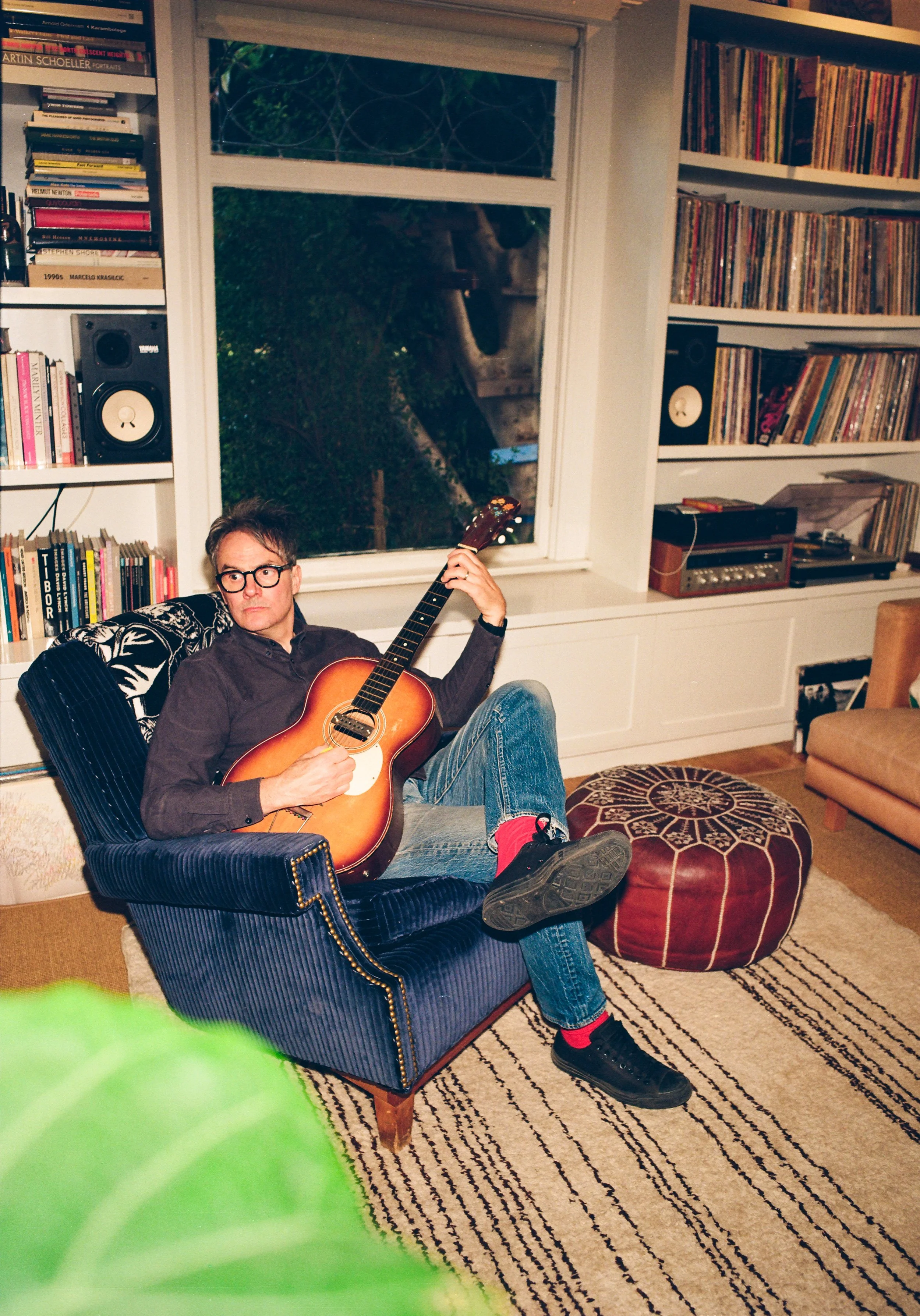INTERVIEW: Mike Viola Is here for the art, not your analytics
10/21 @ Bearsville Theater, Woodstock
Photos by Charles Weinmann
“[Before those months] I felt like I was writing all the time, but it wasn't for me and I felt like I was writing for a character. But these cool ideas, this cool thing? I shifted into a new place”
What does it mean to be a “musician’s musician?” Someone who’s more content with the process than the product, happy to be as much a part of the background creation as they are to be the one on stage. Mike Viola has embodied this attitude for decades, through his work as a producer, singer, songwriter, and guitarist. Fresh off touring with Panic! At The Disco, he’s embarking on his own tour which will bring him to Bearsville Theatre this Tuesday, October 21. Ahead of the show, Mike and I chatted about his latest record, Paul McCarthy, his creative process, and plenty of stories from his different endeavors in the industry.
Going from touring stadiums with Brendon Urie to playing Bearsville Theater feels quaint, but he’s excited for the change.
“When I do the Panic! At The Disco tours, it's playing guitar in a big rock band – everything's on your mark. The set list is a certain way, there's literally flames behind me and lasers. We feel like we're in KISS when we do that. It's a little bit like you're a little bit detached from it. The singer who's up front, he's really carrying the show to be honest with you. And it's so fun, I'm not taking anything away from it. But when you do the solo shows, it's really as raw as it can be. It's almost like doing stand-up comedy. I've never done stand-up comedy, but I know a lot of stand-up comics, and you just have a bunch of ideas written down on a piece of paper, and you just go out there and try to connect with the crowd. And if you don't connect with the crowd, you're dead.”
Though Mike will be onstage solo, the album was written and recorded with two close collaborators and friends, the aforementioned Brendon Urie, as well as Jake Sinclair. The trio came to be around the top of 2022, when the three would write five days a week or more, for no purpose other than writing itself. The process went on for nearly nine months. “Brendon was sort of burnt on showbiz, just to put it bluntly, he was just kind of fried. He had platinum records and number one hits and everything. He was just kind of cooked, so he wanted to just play,” Mike explained. While the Panic! Record Viva Las Vengeance was being created at the same time, there was also a break from the writing the guys had been doing before. “[Before those months] I felt like I was writing all the time, but it wasn't for me and I felt like I was writing for a character. But these cool ideas, this cool thing? I shifted into a new place where I was writing from a fantasy point of view,” he elaborates.
That fantasy isn’t from the place of the current touring guitarist or solo artist, however. Instead, it’s the kid who “wanted nothing more but to play the Boston Garden. I got in touch with my teen self, if that makes sense, and it was really fertile.”
Mike’s career actually began just outside of Boston in the 80s, during which time he was even flown out to L.A. to record with Kim Fowley. Upon returning to Boston, he ditched the L.A. lifestyle and played clubs around the area, eventually moving to New York City and forming the band Candy Butchers. Mike knows he has no one special hit that everyone shouts out at shows, no one track that made the rounds on Billboard or the radio.
In the midst of this topic, he recalls something a friend said to him about his catalog. “My friend, who’s also a manager, once said to me, ‘You're in this really interesting, unique role where you didn't have a big hit at any point in your career, but you've had these records that people really love. The numbers are big enough so that you can live your life and keep moving forward, but you don't have to worry about playing that song that everybody wants you to play, you know?’ I was like, wow, I never really looked at it that way. Especially if it was a one-hit-wonder type thing, I don't have to play the song that everybody knew me from.”
In fact, Mike narrowly avoided becoming a one-hit-wonder back in the 90s while collaborating with friend Adam Schlessinger of Fountains of Wayne on a song you just may have heard of…”That Thing You Do,” from the movie of the same name. He even turned down going on Howard Stern’s radio show to reveal that he was the voice behind the song.
As Mike tells it, “I worked on that movie, That Thing You Do; that's me singing that [song]. But when I was a young man, I was smart enough to bury it. I didn't want to be like, ‘I'm the guy!’ you know what I mean? I like [it], but I don't want to do it all the time. But when I do it, it's a joyous thing, because I worked on that with one of my best friends, Adam Schlesinger, and Andy Chase, and we all made a lot of music together. That just was this wild thing that tore through the curtain of pop culture, just somehow snuck on stage. It was really, really fun.”
While many listeners were wondering if Mike’s music, both with Candy Butchers and on his own, sounds like that hit track, they’ll be surprised to find songs that are much more poignant and personal. Music, for Mike, isn’t something that follows analytics or trends. Instead, it comes straight from the body.
Each time he records, the question is always “if I can get in touch with this particular part of my creative life, in that kind of freedom where there's no judgments, and it's mostly in my body.” He compares it to performing physical activity with the body, like yoga, and suddenly crying. “I feel like it's because of emotions that come out. It's like that with music, too, because when you sing, if you're really singing, your whole body goes into it. It’s the same thing with playing. That's why drummers are such a pain in the ass! There's so much that goes into doing that and they're undervalued from time to time.”
His goal is to create that as a producer as well at Barebones Studio. Working with artists from Andrew McMahon to Mandy Moore to Ryan Adams, he’s got a track record a mile long. “With other artists, I try to bring that to the table as a producer as well. [It’s like a] ‘We can do this until my mom gets home’ type of thing, so we can do whatever we want. I just try to help them access whatever part of themselves feels most fertile. There's really no trick to that, but it's maybe just creating an atmosphere of anything goes, everybody's safe here. We can do whatever we want.”
For Mike, creating his own music and others is never about topping the charts; it’s about putting out music that’s truthful and raw. Many of his songs come from a place of early trauma, with his father passing away while Mike was a teenager and his first wife passing from cancer only two years after they were married. While he is remarried with a happy family now, music is still a way to process grief and challenging emotions, regardless of popular reception. “The hardest thing in the world is to write a really simple, catchy, happy song. To make it come from a place worth repeating, it's really hard. That being said, it's also hard to write something that's emotional and therapeutic in a way, without sounding maudlin and too much of an ‘Oh my God. What a cheap way to access your feelings,’” he admits.
“I don't really think about what I'm writing about. Usually, it's stream of consciousness. The content really drags me into what I'm trying to say with my body through my song. A lot of times it is working out trauma. It’s not like I did the analysis and said, ‘I should probably write a few more of those.’ I had a batch of songs written for a new album that I'm recording for 2026, but I started writing other songs that I feel were better and more in touch with physically what I'm trying to say. Some of them are sad, but not all of them.”
He talks about one of these unreleased tracks in detail, “South Shore Girl,” explaining the reality behind it. “It's about me and my girlfriend, growing up. We eventually got married, and then she got cancer and died. It sounds like, what a gnarly premise for a song. Why would you drag a listener through that whole thing? But it didn't come from my brain, it wasn't this crafted thing that I’m expecting people to understand. It truly is more physical and it's beautiful and it's sad, but it's more joy. You have to kind of hear it to know what I'm talking about, but I'll play it at the Bearsville Theater.”
Between shows and the next record, Mike is going to keep creating, not just music, but also a different type of creation: the Mike Viola fanzine “Torp” named after a track on his latest album. For Mike, who does much of his producing in an old school fashion – ditching Pro-Tools for cutting tapes – it’s a way to connect with fans off screen and in a more sentimental way. “It’s totally handmade, sitting at my desk with glue, Scotch Tape, and a printer. Nothing's done on Photoshop or anything like that, just because I don't own it and I don't know how to use it anyway. I just do it by hand, but it looks janky and fun that way.”
Included in the zine are favorite songs he’s heard on the local college radio station, KXLU 88.9 FM, drawings, lists of what's free and cool, and other things he loves. “It's really just a way for me to reach out to people that are crazy enough to write me a letter and send it to a post office box with five bucks in it, and then I send them a zine,” he says, explaining that the five dollars doesn’t cover the cost of the zine, nor does he want it to. It just weeds out the people asking too many questions. It builds a form of community that’s rare these days, and puts an emphasis on sharing love and energy. He even publishes fan art and letters that are sent in.
This zine perfectly encompasses Mike’s whole spiel as an artist, and the spiel he’s always had. Though he’s got big names to drop, and flames and lasers when he plays in big stadiums, Mike Viola isn’t here to climb some ladder. He’s here to create art, help others find their own space, and get back to the exciting pressure of finding yourself alone on stage in a grassroots venue, trying to get the faces in front of you to engage with you in your next song. He’s truly the musician’s musician.
To see Mike Viola at Bearsville Theater, buy your tickets here.
To learn more about Mike Viola and all of this projects, check out his website here.



